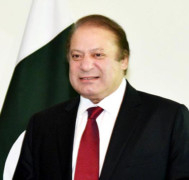
As members of Pakistan’s ruling structure sought to oversee a further consolidation of democracy across the South Asian country this past week, Pakistan faced yet another challenge to its future outlook.
Elections of more than half the members of the upper house of parliament known as the senate, during this time were filled with accounts of widespread use of bribes. It’s therefore hardly surprising that questions over the credibility of the process have only cast doubt on Pakistan’s increasingly tainted democratic politics.
Ultimately, the controversy has raised compelling questions over the future of the quality of democracy of the nuclear armed country at a time when Pakistan needs to oversee increasing national unity.
Members of the senate are elected through an indirect process where the electoral college consists of members of Pakistan’s provincial legislatures as well as the lower house of parliament known as the national assembly. The senate is the upper house of parliament while political clout at the federal level lies eventually with the national assembly whose members elect the country’s prime minister.
And yet, evidence of different political parties and individuals seeking desperately to get a larger presence in the senate suggests a paucity of morals in Pakistan’s politics. It also suggests a blind obsession with occupying the seats of power, no matter how ceremonial.
The controversy has clearly defeated the principle behind the importance of elected legislatures to begin with. In the case of an upper house, Pakistan’s senate ought to be no different from similar institutions in other bicameral legislative structures.
This forum is indeed one which should allow individuals who have acquired positions of eminence in their respective occupations, to eventually be brought into the political mainstream without being exposed to the rigours of constituency politics.
However, the controversy surrounding such an august forum has tarnished the image of the institution. More importantly, such an outcome should come as no surprise to long term observers of Pakistan’s politics.
Over time as Pakistan continues its democratic journey, the country’s repeated failure to undertake bold new reforms has made the exercise simply meaningless. Consequently, it is hardly surprising that accounts of corruption surrounding the build up to Pakistan’s latest senate elections, eventually received no more than mere lip service from Pakistan’s ruling politicians.
Going beyond this latest electoral contest, Pakistan’s own outlook will most likely not improve for the foreseeable future. If indeed there is a degree of corruption surrounding high political institutions, it’s hard to imagine exactly how Pakistan will embark on a badly needed process of nationwide reforms surrounding its key institutions.
Crisis of governance
Though the government of Prime Minister Nawaz Sharif is set to receive the bulk of the blame surrounding this latest saga, no single political party can squarely be held responsible. Instead, a much wider collective sense of responsibility involving Pakistan’s mainstream political players must be the outcome of any half honest attempt to reset the future political direction for the better.
For the moment, such a reset is unlikely to take shape in a country where a crisis of governance continues to widen without any credible reforms even remotely beginning to take shape. Across Pakistan, a largely defunct scenario in matters related to the interests of common citizens says much about the disconnect between the populace and the ruling structure.
In the meantime, this latest sorry episode is also a powerful reminder of the degree to which continuing on the democratic path was once meant to ultimately usher in a period of democratic stability. That indeed was the argument from pro-democracy activists when Pakistan returned to civilian rule in 2008 following the nine-year military rule of General Pervez Musharraf.
In principle, a stable democracy must always provide a much stronger plank for nation building than a military-led regime. And yet, stability can just not come to a country where ruling politicians remain detached from real-life challenges as the case with present-day Pakistan.
More than 21 months after Sharif was elected as prime minister, his regime’s ability to tackle real life challenges remains not even half impressive. Instead of dealing with a host of societal challenges that are bound to fuel the factors that support militancy —Pakistan’s number one ongoing challenge — the country’s present-day ruling politicians are eagerly looking to pursue the state’s investments in visibly large projects. For instance, instead of pushing ahead with a robust expansion in state schools and colleges to forcefully raise literacy levels, the government appears more obsessed with overseeing large new infrastructure projects like roads and transport schemes.
It’s therefore not surprising that there is a widespread sense of complacency, which fuels the way Pakistan is being run. The idea that politicians can pay to get elected to one of the top legislatures, which in this case is the senate, appears to be the outcome of how Pakistan’s overall direction has changed for the worse.
If by a stroke of luck or magic, or both, such a trend is changed for the better, Pakistan could overcome the many challenges that it faces. And yet, such a change requires a very different mindset from the one prevailing in the country at the moment. More importantly, it requires acceptance of responsibility and willingness to change the top echelons of Pakistan’s politics. Tragically, however, judging by events of the past week, that fundamental change of mindset among Pakistan’s rulers indeed seems like a horribly big missing element.
Farhan Bokhari is a Pakistan-based commentator who writes on political and economic matters.








